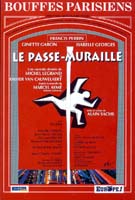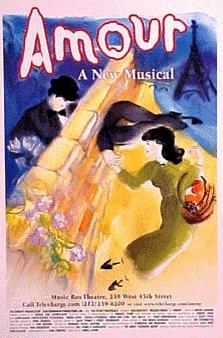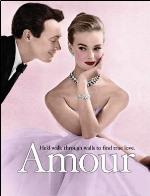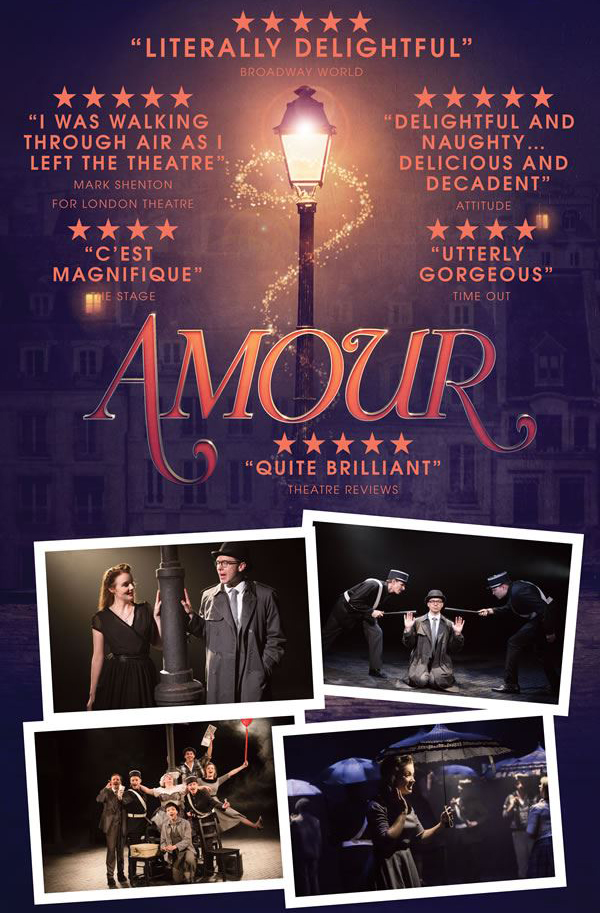Amour
Musical (2002) - Flop

Adapted from the 1943 short story Le Passe-Muraille by Marcel Aymé, it is set in Paris shortly after World War II and centers on a shy, unassuming clerk who develops the ability to walk through walls, and who challenges himself to stick to his moral center and change others' lives, and his own, as a result.
In 1997, Legrand, a noted film composer and jazz musician, but a newcomer to stage musicals at age 65, brought the musical (under its original title, Le Passe Muraille) to Paris where it won the Prix Molière for Best Musical.
The Broadway production, directed by James Lapine and presented without intermission, opened on October 20, 2002 at the Music Box Theatre. The show closed after 17 performances and 31 previews. The cast included Malcolm Gets and Melissa Errico.
The musical received mostly negative reviews in America, although Errico, Gets and the score were praised. Ben Brantley, in his review for The New York Times, wrote: "Even charming is too weighty a word to describe the wispy appeal of Amour" The Talkin' Broadway reviewer, however, wrote: "Broadway's Music Box Theatre may have found its most ideal tenant in quite a while. The delightful little jewel box of a musical, Amour, ...deserves a lengthy stay there, where it may enchant audiences for a long time to come." Cary Wong in filmscoremonthly wrote: "The lyrics are mostly pedestrian and uninvolving, and they make the already stock characters even more one-dimensional."
A "reconceived production" was produced by Goodspeed Musicals from August 11, 2005 through September 4.
"Dutilleul, petit employé de bureau sans avenir, découvre qu'il passe à travers les murs, et devient Garou-Garou le gentleman cambrioleur, qui la nuit dévalise les banques et les bijouteries de son quartier.
Du bureau des fonctionnaires tristes en blouses grises, à l'appartement de la Butte Montmartre, avec ses rues commerçantes, les marchands de quatre-saisons, les agents à bicyclettes, le docteur un peu fou, c'est tout l'univers de Marcel Aymé."
Afficher le synopsis détaillé
We are in Paris, in Montmartre, shortly after the second world war. It is morning. Our hero, whom we'll call Monsieur , is on his way to work. He is an ordinary civil servant, but very committed to his humdrum job, much more so than his rather grumpy colleagues. Dusoleiks unexciting life, however, is periodically irradiated by his beautiful neighbour, Isabelle. He lives for a glimpse of her. As he returns from work, we see her cross the square. Unbeknownst to him, despite her respectable marriage to a court official, her life is as banal and lonely as 's own. She is addicted to novels and magazines, and dreams of romance and intrigue. As evening falls we meet the other habitués of the square: a painter; a whore; a newsvendor; and the Prosecutor, Isabelle' husband, with two policemen in his pay.
On the way up his stairs curses at yet another power outage, a symptom of postwar austerity. When the lights come back on, he, to his astonishment, is not outside his flat, but in it. Whence has he acquired this mysterious gift of being able to pass through solid walls? He solicits medical attention. Clutching the pills the Doctor has prescribed, he returns home, choosing to ignore his newfound powers. His life may not be spectacular, but at least it's familiar. The next day, however, he is grossly insulted by his new boss and uses his gifts to wreak glorious vengeance.
Meanwhile, Isabelle is sad and lonely. Her plight is ignored by an uncaring husband who has his own private pleasures. now decides to use his powers to do good. Under the nom-de-crime of Passepartout, he begins his Robin Hood campaign by making a gift of diamonds to a rather dejected whore who is failing to attract the business she did during the war. may be able to walk through walls, but he still lacks the courage to declare himself to Isabelle. She, however, has turned her fantasies towards this Passepartout, her new hero. The Painter notices his secret passion and warns him against acting on it. Nevertheless, hatches a plan. He will break into the deepest vault of the Banque de Paris and set off the alarm, causing himself to be caught in flagrante. How will Isabelle be able to resist?.
In jail waits for Isabelle to visit him. The attention he actually attracts – from two of his female work mates – is much less welcome. Disgruntled, he walks through the wall and out of prison. Back in the square, he reveals himself to Isabelle. When she says she cannot leave her husband, decides to face up to his destiny and to stand trial for his crimes.
We are now in court. is represented by a nervous young lawyer, his only protection against the wrath of Isabelle's husband, the Public Prosecutor. The somewhat bizarre proceedings are interrupted by the appearance of Isabelle. She has an astonishing revelation: her husband was a Nazi collaborator in the war. He should be on trial, not . explains that everything he did, he did for love. And, this being France, he is pardoned. However, just as he is about to follow Isabelle home, he loses his nerve. The entreaties of the company, nonetheless, prevail, and our two lovers spend a night of passion together.
The next morning is awakened by the world press, all keen for him to display his powers for the cameras. He has a hangover–from love, from champagne, from everything. Looking for some aspirin, he finds the pills the doctor gave him. They provide the cure … not for his headache, but for his ability to walk through walls. As the pills take effect, is caught mid-leap and becomes stuck fast in a wall. One by one his friends arrive, and, led by Isabelle, the company laments what might have been.
Nevertheless, far from being an ordinary man, is remembered in song and fable. And to this day there is a statue in Montmartre of Le Passe-Muraille, the man who could walk through walls. And that is the only part of this story which is true …
Le passe-murail (titre original français)
Un de très grands flops de Broadway: seulement 17 représentations. La chose est d'autant plus surprenante puisqu'il s'agissait de l'adaptation en anglais du musical "Le passe-muraille" qui avait été un grand succès à Paris (Molière de la meilleure comédie musicale en 1997),
1 Amour peut-être considéré comme un Flop musical
Overture – Company
Office Life – Dusoleil, Madeleine, Claire, Bertrand and Charles
Going Home Alone – Dusoleil
Other People's Stories – Isabelle and Dusoleil
Street Vendors' Waltz – Whore, Painter, Newsvendor, Policemen, Prosecutor, Isabelle and Dusoleil
Dusoleil Walks Through the Wall – Dusoleil
The Doctor – Doctor and Dusoleil
Ordinary Guy – Dusoleil
Dusoleil's Revenge – Boss, Dusoleil, Madeleine, Claire, Bertrand and Charles
Somebody – Isabelle
Prosecutor's Song – Prosecutor
Whore's Lament – Whore and Dusoleil
Monsieur Passepartout – Newsvendor, Painter, Whore, Madeleine and Policemen
Special Time of Day – Isabelle and Dusoleil
Waiting – Dusoleil
Latest News – Newsvendor, Whore and Painter
Dusoleil in Jail – Dusoleil, Madeleine and Claire
Painter's Song – Painter
Isabelle on Her Balcony – Isabelle, Dusoleil and Prosecutor
Transformation – Company
The Advocate's Plea – Advocate
The Trial – Monsieur le President, Madeleine, Whore, Painter, Prosecutor, Dusoleil and Isabelle
Duet for Dusoleil and Isabelle – Dusoleil and Isabelle
Whistling Ballet – Dusoleil, Painter, Whore, Newsvendor, Madeleine and Policemen
Amour – Isabelle and Dusoleil
Dusoleil Meets the Press – Dusoleil, Newsvendor, Doctor and Company
Serenade – Dusoleil, Isabelle and Company
Dusoleil: a self-proclaimed "ordinary guy" who discovers he can walk through walls
Isabelle: an unhappily married woman and the object of Dusoleil's affections
Whore, Painter, Newsvendor: three street workers who support Dusoleil
Prosecutor: Isabelle's husband, a man with more than a few skeletons in his closet
Boss: Dusoleil's nasty boss
Doctor Roucefort: Dusoleil's doctor, who gives him the eventual cure to his intangibility
Madeleine, Claire, Charles, Bertrand: Dusoleil's co-workers. The women reveal feelings for Dusoleil when they discover he is the elusive "Monsieur Passepartout"
Policemen: "henchmen" hired by the prosecutor to keep the people of Montmartre in check
Monsieur le President: President of the tribunal that tries Dusoleil
Advocate: Dusoleil's lawyer, who appears on behalf of Dusoleil on his very first day in court
Aucun dossier informatif complémentaire concernant Amour
Aucun dossier informatif complémentaire concernant Amour

Version 1
Amour (1997-??-Théâtre des Bouffes Parisiens-Paris)
Type de série: OriginalThéâtre: Théâtre des Bouffes Parisiens (Paris - France) Durée : Nombre : Première Preview : Inconnu
Première: Inconnu
Dernière: InconnuMise en scène : Alain Sachs • Chorégraphie : ???? ???? • Producteur : Star(s) : Commentaires longs: Le titre français est "Passe-Murailles"

Version 2
Amour (2002-09-Music Box Theatre-Broadway)
Type de série: OriginalThéâtre: Music Box Theatre (Broadway - Etats-Unis) Durée : Nombre : 31 previews - 17 représentationsPremière Preview : 20 September 2002
Première: 20 October 2002
Dernière: 03 November 2002Mise en scène : James Lapine • Chorégraphie : Jane Comfort • Producteur : Star(s) : Avec: Isabelle - Melissa Errico / Dusoleil - Malcolm Gets / Charles - Lewis Cleale / Doctor - John Cunningham / Advocate - Christopher Fitzgerald / Painter - Norm Lewis / Madeleine - Sarah Litzsinger / Claire - Nora Mae Lyng / Boss - Bill Nolte / Prosecutor - Lewis ClealeCommentaires longs: Un terrible flop : 17 représentations pour ce musical créé par une star internationale: Michel Legrand. D'autant plus imprssionnant qu'il s'agit de l'adaptation anglaise d'un triomphe ("Passe-Muraille") à Paris.

Version 3
Amour (2005-08-Norma Terris Th-Chester)
Type de série: RevivalThéâtre: Norma Terris Theatre in Chester (Chester - Etats-Unis) Durée : 3 semaines Nombre : Première Preview : 04 August 2005
Première: 11 August 2005
Dernière: 04 September 2005Mise en scène : James Lapine • Darko Tresnjak • Chorégraphie : Peggy Hickey • Producteur : Star(s) :

Version 4
Amour (2019-05-Charing Cross Theatre-London)
Type de série: RevivalThéâtre: Charing Cross Theatre (Londres - Angleterre) Durée : 2 mois 1 semaine Nombre : Première Preview : 02 May 2019
Première: 08 May 2019
Dernière: 20 July 2019Mise en scène : Hannah Chissick • Chorégraphie : Math Cole • Producteur : Star(s) : Avec: Gary Tushaw, Anna O’Byrne, Alasdair Harvey, Elissa Churchill, Claire Machin, Keith Ramsay, Steven Serlin, Alistair So, Daniel Stockton, Laura Barnard and Jack Reitman.
Pas encore de video disponible pour ce spectacle